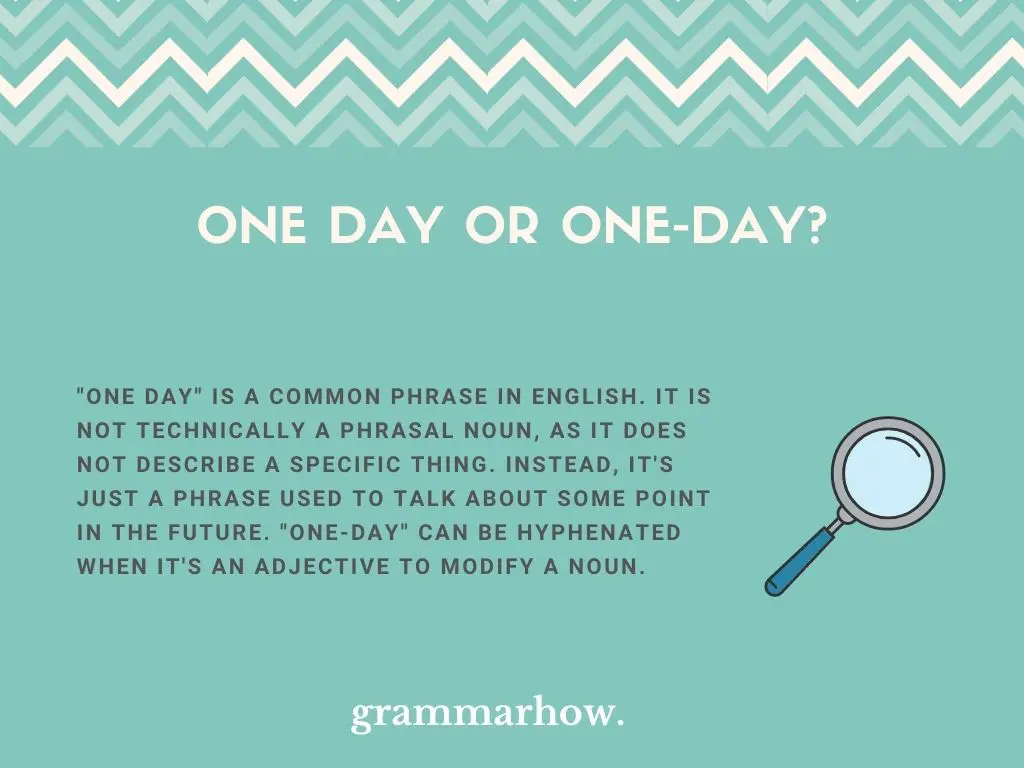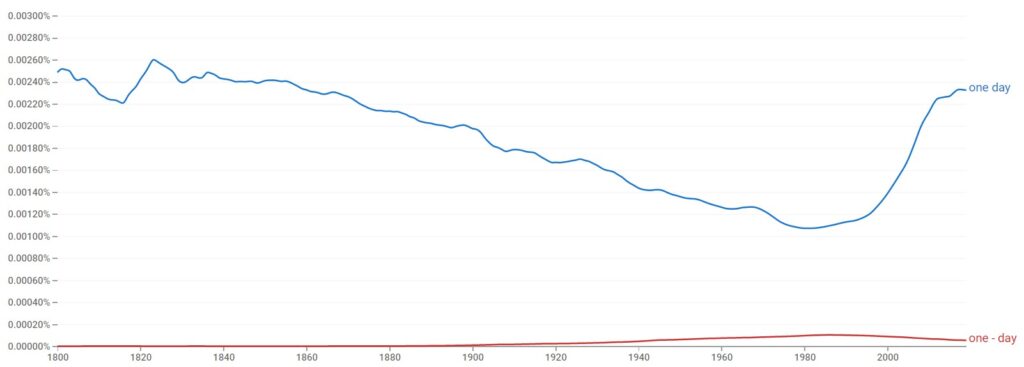“One day” is a common phrase we use to talk about a random point in the future. However, it can also be hyphenated in very specific cases. This article will look into when it’s correct as one or two words and how to work it out.
One day vs. One-day
“One day” is a common phrase in English. It is not technically a phrasal noun, as it does not describe a specific thing. Instead, it’s just a phrase used to talk about some point in the future. “One-day” can be hyphenated when it’s an adjective to modify a noun.

According to Google Ngram Viewer, “one day” is vastly more popular than the hyphenated form. From these results, you might even believe that “one-day” is never correct, and no native speakers use it.

However, the results are slightly skewed in favor of “one day” since it’s just a common phrase. It’s much more contextually appropriate to write “One day” compared to “one-day.” Both forms are correct, but you’ll have more luck using the phrase over the adjective.
The Cambridge Dictionary and The Oxford Dictionary provide a definition for “one day.” They both note that it is a phrase that works to talk about some point in the future. It is not a noun or adjective form.
While neither dictionary mentions “one-day” as an adjective form, we can follow AP Style rules to understand that hyphenating the words is acceptable. We’ll touch more on what that means a little later.
For the time being, check these examples out to help you figure out the differences between what we’ve explained:
- Phrase: One day, I’m going to take on the world!
- Adjective: This is a one-day vacation, and that’s as much as we can offer!
One day
“One day” is a standard English phrase. It’s a time-based phrase that talks about a point in the future. There is no way to put a timeframe on it. We use it to talk about something that we know will one day happen (as long as we put work in).
A hyphen would completely confuse the original idea behind the phrase, which is why it’s not used.
Here are a couple of examples to explain it to you:
- I’m sure that one day, you’ll have a loving husband at your side. I’ll be there whenever that occurs.
- One day, you’re going to regret saying something like that to me! Just you wait!
- I’ll be there one day! I know if I put enough time into it, I’m going to blow this out of the park.
- I’m sure things will change one day. I always remain hopeful because it makes me feel better!
One-day
While uncommon, “one-day” is still grammatically correct. We can use it whenever it modifies a noun. The hyphen allows us to link “one” and “day” to show that they both modify the same word and their definitions overlap.
The AP Stylebook teaches us that hyphens are connectors between multiple words. When more than one word modifies the same noun in a sentence, we must place hyphens between them to show how this modification occurs.
It’s most common to see hyphens create compound adjectives when a noun comes directly after them. This is just a common trend that helps many readers understand what the adjective is doing.
Perhaps you’d benefit from checking these examples out to see how you can use it correctly:
- This is a one-day offer, and I will not be giving you another chance to get something like this!
- It’s a one-day deal! Please just take it so that we can both move on from this one!
- I don’t think you appreciate the one-day holiday that we’ve been on! I really thought it was a lot of fun.
- It’s not a one-day vacation without a little bit of alcohol! Go and get the orders in at the bar!
Is “Day” Capitalized In The Word “One-Day”?
You’ll rarely find that both parts of “one-day” are capitalized. This is because hyphens are treated as singular words. If we start a sentence with “one-day,” only “One” needs a capital letter.
With that in mind, you might capitalize both parts when “One-Day” is in a title. This is only applicable if every word in your title is capitalized. It will help “one-day” to stay more true to your stylistic choices.

Martin holds a Master’s degree in Finance and International Business. He has six years of experience in professional communication with clients, executives, and colleagues. Furthermore, he has teaching experience from Aarhus University. Martin has been featured as an expert in communication and teaching on Forbes and Shopify. Read more about Martin here.

